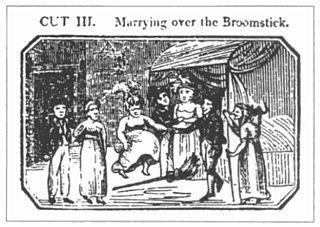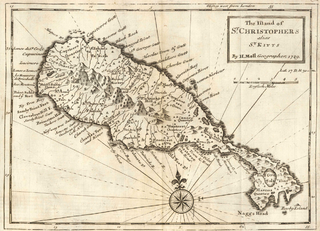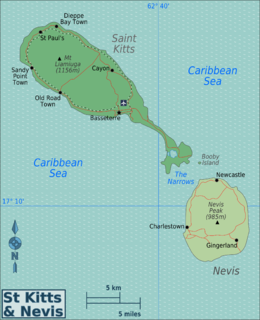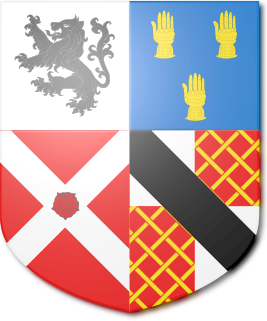Further reading
- Hubbard, Vincent K. 2002. "Swords, Ships & Sugar". Premiere Editions International, Inc. ISBN 1-891519-05-0. A complete history of Nevis. pp.156-157
The Cottle Church was an Anglican Church on the island of Nevis. It was built at the request of Thomas Cottle, a Nevisian lawyer, by the people he had enslaved. Ground was broken in 1822 and the church was finally finished in 1824, after a severe economic depression.
The Cottle Church was opened to the public on May 5, 1824, and it was the first church on the island of Nevis which welcomed anyone to come and worship, including enslaved people.
The first Reverend of the Cottle Church was Rev. Daniel Davis. After Thomas Cottle's death in 1828, the church fell into disuse. It was then rebuilt by Governor Sir Graham Briggs in the late 19th century, but because of the population decline on the island, the Cottle Church again fell into ruins at the turn of the 20th century. Today it is now being preserved and can be seen by the public.

Jumping the broom is a phrase and custom relating to a wedding ceremony where the couple jumps over a broom. It has been suggested that the custom is based on an 18th-century idiomatic expression for "sham marriage" or "marriage of doubtful validity"; it was popularized in the context of the introduction of civil marriage in Britain with the Marriage Act 1836.

Nevis is a small island in the Caribbean Sea that forms part of the inner arc of the Leeward Islands chain of the West Indies. Nevis and the neighbouring island of Saint Kitts constitute one country: the Federation of Saint Kitts and Nevis. Nevis is located near the northern end of the Lesser Antilles archipelago, about 350 kilometres (220 mi) east-southeast of Puerto Rico and 80 kilometres (50 mi) west of Antigua. Its area is 93 square kilometres (36 sq mi) and the capital is Charlestown.

Saint Kitts and Nevis, officially the Federation of Saint Christopher and Nevis, is an island country in the West Indies. Located in the Leeward Islands chain of the Lesser Antilles, it is the smallest sovereign state in the Western Hemisphere, in both area and population, as well as the world's smallest sovereign federation. The country is a Commonwealth realm, with Charles III as King and head of state. It is the only sovereign federation in the Caribbean.

Saint Kitts and Nevis have one of the longest written histories in the Caribbean, both islands being among Spain's and England's first colonies in the archipelago. Despite being only two miles apart and quite diminutive in size, Saint Kitts and Nevis were widely recognized as being separate entities with distinct identities until they were forcibly united in the late 19th century.

Saint Kitts, officially the Saint Christopher Island, is an island in the West Indies. The west side of the island borders the Caribbean Sea, and the eastern coast faces the Atlantic Ocean. Saint Kitts and the neighbouring island of Nevis constitute one country: the Federation of Saint Kitts and Nevis. Saint Kitts and Nevis are separated by a shallow 3-kilometre (2 mi) channel known as "The Narrows".
The history of Anguilla runs from the beginning of human habitation, probably via settlement from South America, through its colonization by the English in the early modern period, to the present day. Following a series of rebellions and a short-lived period as an independent republic during the 1960s, Anguilla has been a separate British overseas territory since 1980.

Emancipation Day is observed in many former European colonies in the Caribbean and areas of the United States on various dates to commemorate the emancipation of slaves of African descent.

Oxhill is a village in South Warwickshire, England, off the A422 road between Stratford-upon-Avon and Banbury. The population taken at the 2011 census was 305. It lies in the administrative district of Stratford-on-Avon in the area known as the Vale of the Red Horse. The village is mentioned in the Domesday Book as "Octeselve" and has a 12th-century church dedicated to Saint Lawrence. The indentions in the chancel window mullions are believed by many to be the marks made by local archers sharpening their arrowheads. Because of the holiness and sacredness of the church, the blessed arrows were also presumed to have divine accuracy.

The Concerned Citizens' Movement (CCM) is a Nevis-based political party in Saint Kitts and Nevis. Led by Mark Brantley, it is currently the largest party in Nevis, holding all three seats Nevisian seats in the National Assembly and four out of five seats in the Nevis Island Assembly. The CCM operates only in Nevis and for the 2022 general election is in a One Movement alliance with the People's Action Movement (PAM) operating in Saint Kitts, following the breakdown of the governing Team Unity alliance.

Slavery in the British and French Caribbean refers to slavery in the parts of the Caribbean dominated by France or the British Empire.
Thomas Cottle, Esq. (1761–1828) was a lawyer on the island of Nevis. In 1822, Thomas started to build a church for all people on the island, including slaves. "The Cottle Church", as it is now called, was completed in 1824 and opened on May 5 that year. He married Frances Huggins, daughter of Edward Huggins, one of the richest and most powerful planters in all of Nevis.
Daniel Gateward Davis (1788–1857) was an abolitionist and the inaugural Bishop of Antigua from 1842 until his death.

The monarchy of Saint Kitts and Nevis is a system of government in which a hereditary monarch is the sovereign and head of state of Saint Kitts and Nevis. The current monarch of Saint Kitts and Nevis, since 8 September 2022, is King Charles III. As sovereign, he is the personal embodiment of the Crown of Saint Kitts and Nevis. Although the person of the sovereign is equally shared with 14 other independent countries within the Commonwealth of Nations, each country's monarchy is separate and legally distinct. As a result, the current monarch is officially titled King of Saint Christopher and Nevis and, in this capacity, he and other members of the royal family undertake public and private functions domestically and abroad as representatives of Saint Kitts and Nevis. However, the King is the only member of the royal family with any constitutional role.

The Anglican Diocese of Jamaica and the Cayman Islands was formed as the Diocese of Jamaica in 1824. At that time the diocese included the Bahamas and British Honduras, but the Bahamas became a separate Diocese in 1861 and British Honduras in 1891. In 2001, the title of the Diocese of Jamaica was extended to include ‘and the Cayman Islands’ to recognise the growth of the Anglican Church in those islands, which had become part of the diocese of Jamaica in the 1960s.

The issue of slavery was historically treated with concern by the Catholic Church. Throughout most of human history, slavery has been practiced and accepted by many cultures and religions around the world, including ancient Rome. Certain passages in the Old Testament sanctioned forms of temporal slavery as means to pay a debt. After the legalization of Christianity under the Roman empire, there was a growing sentiment that many kinds of slavery were not compatible with Christian conceptions of charity and justice; some argued against all forms of slavery while others, including the influential Thomas Aquinas, argued the case for slavery subject to certain restrictions. The Christian West did succeed in almost entirely enforcing that a free Christian could not be enslaved, for example when a captive in war. However, this itself was subject to continual improvement and was not consistently applied throughout history. The Middle Ages also witnessed the emergence of orders of monks such as the Mercedarians who were founded for the purpose of ransoming Christian slaves. By the end of the Medieval period, enslavement of Christians had been largely abolished throughout Europe although enslavement of non-Christians remained permissible and had seen a revival in Spain and Portugal. The permissibility of slavery remained a subject of debate within the Church for centuries, with several Popes issuing bulls on the issue, such as Sublimis Deus.
Coromantee, Coromantins, Coromanti or Kormantine is an English-language term for enslaved people from the Akan ethnic group, taken from the Gold Coast region in modern-day Ghana. The term was primarily used in the Caribbean and is now considered archaic.

John Pretor Pinney was a plantation owner on the island of Nevis in the West Indies and was a sugar merchant in Bristol. He made his fortune from England’s demand for sugar. His Bristol residence is now the city's Georgian House Museum.

The Stapleton Baronetcy, of The Leeward Islands, is an extinct title in the Baronetage of England. It was created on 20 December 1679 for William Stapleton, who followed Charles II into exile in France, and after the Restoration was appointed deputy-governor of Montserrat and captain-general of the Leeward Islands.
White Kittitians and Nevisians are people of Saint Kitts and Nevis of European descent. Approximately 2.2% of the population of Saint Kitts and Nevis is European as of 2001.